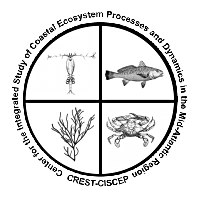
The goals of the CREST-CISCEP Center are to:
- Become a major research resource and partner with institutions as well as state and federal agencies for understanding, modeling, and predicting the impacts of human activities and climate variability in the mid-Atlantic region;
- Integrate research and education by training high school students, undergraduate and graduate students, high school and middle school teachers, as well as post-doctoral fellows;
- Improve infrastructure for research and education in marine and environmental sciences; and
- Improve public awareness and literacy of coastal aquatic ecosystems and impacts on them by anthropogenic activities and climate variability.
The CREST-CISCEP program has brought together a diverse team of scientists to conduct a collaborative study of the effects of climate variability on trophic interactions and food web dynamics, exchange of materials between Maryland Coastal Bays and the coastal ocean, and dynamics of heterotrophic bacteria including Vibrio spp. CREST-CISCEP scientists have areas of expertise that include geochemistry, phytoplankton and zooplankton ecology, benthic invertebrate ecology, fish ecology, environmental microbiology, biogeochemistry, climate modeling, ecosystem modeling and physical oceanography.
Vision Statement
To integrate research and education through exemplary partnerships, and sustain nationals international competitiveness in the studies of estuarine and coastal ecosystem processes and dynamics.

NSF CREST Center for the Integrated Study of Coastal Ecosystem Processes and Dynamics
Funding Agency: National Science Foundation
Award Number: 1547821
Leveraged Programs:


